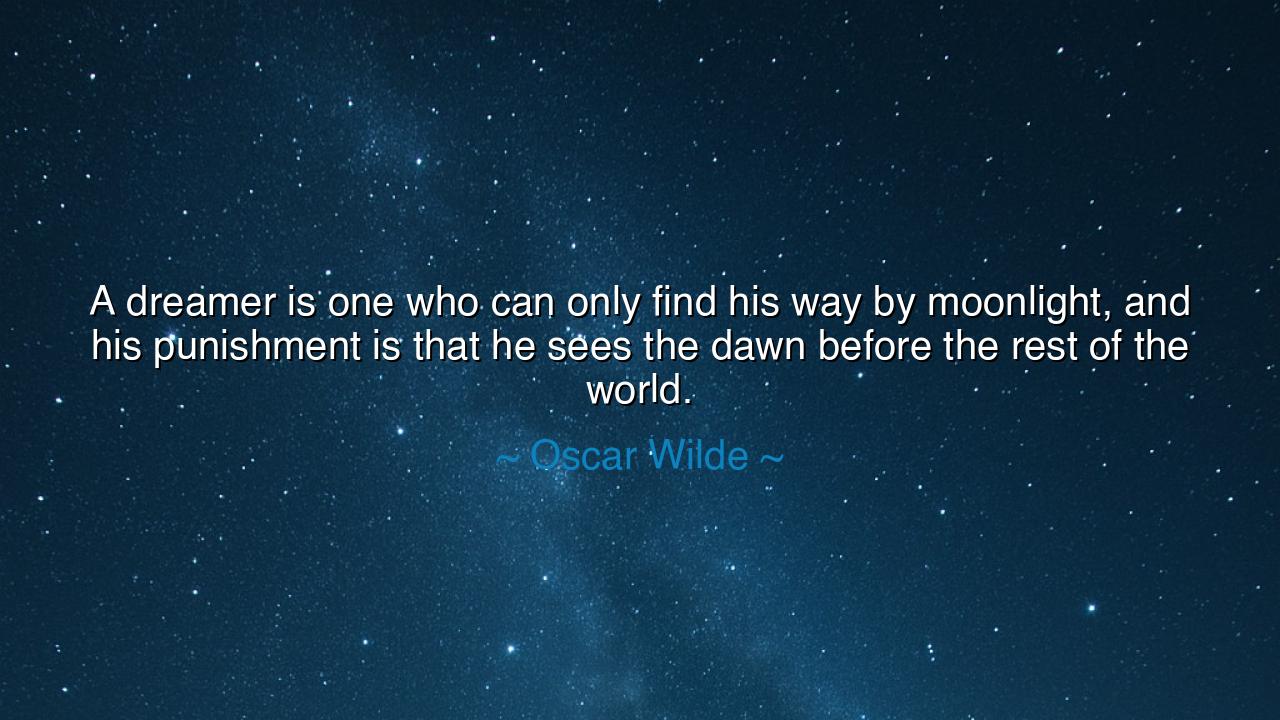
A dreamer is one who can only find his way by moonlight, and his
A dreamer is one who can only find his way by moonlight, and his punishment is that he sees the dawn before the rest of the world.






“A dreamer is one who can only find his way by moonlight, and his punishment is that he sees the dawn before the rest of the world.” — so wrote Oscar Wilde, the poet of paradox and the prophet of beauty. In this haunting line, Wilde gives voice to the eternal plight of the visionary soul — the one who walks where others cannot yet see, who lives guided not by the sun of common reason, but by the moonlight of imagination. The dreamer moves through shadows, following faint glimmers of truth, led not by what is, but by what could be. Yet this gift, Wilde reminds us, is a double-edged one: for to see the dawn before others is also to walk through the darkness alone.
The origin of this quote lies in Wilde’s essay The Critic as Artist (1891), a work that celebrates art, imagination, and individuality. Wilde, who himself lived as both dreamer and outcast, believed that the artist — and indeed, every creative soul — must see the world differently from the multitude. While others live by daylight, bound by convention and certainty, the dreamer must find his path by moonlight — by intuition, by vision, by the quiet glow of inspiration that illuminates what reason cannot. Yet such sight comes with sorrow, for to glimpse the coming dawn is to stand apart from those still asleep, to bear the weight of understanding before others awaken to it.
To find one’s way by moonlight is to trust the subtle, uncertain light of imagination. The moon does not reveal everything — it softens, it hides, it distorts — yet it also transforms the ordinary world into something magical, alive with mystery and depth. So too does the dreamer see beyond appearances. He looks upon ruins and sees cathedrals; he looks upon despair and sees the seeds of hope. His eyes pierce the veil of what is visible to glimpse the invisible truth. But because of this, he is often misunderstood. The world, which lives by the sun — by reason, law, and routine — calls him foolish or mad. Yet history shows that it is precisely such moonlit souls who awaken humanity to new dawns.
Consider Galileo Galilei, the astronomer who first turned his telescope toward the heavens. By the moonlight of his vision, he saw the unseen: that the Earth itself moved, that the heavens were not perfect and unchanging. He saw the dawn of a new truth — and for that sight, he was punished. Condemned by those who clung to the old ways, he was forced to recant his discovery. Yet even in silence, he whispered, “E pur si muove” — “And yet it moves.” He had seen the dawn before the world was ready to open its eyes to it. In this, he embodies Wilde’s truth: that the dreamer’s punishment is to bear the light before others can endure its brightness.
And so it is with every prophet, artist, and thinker who dares to dream beyond the present. Van Gogh painted the stars as living fires while others saw only cold points of light. Rosa Parks refused to surrender her seat, seeing the dawn of justice long before her nation did. Wilde himself, persecuted for his art and his truth, lived the pain of the dreamer’s exile. For such souls, the moonlight guides them toward visions unseen — but it also isolates them. To live ahead of one’s time is to walk through loneliness, to love beauty in a world still blind to it.
Yet Wilde’s words do not speak only of sorrow. In their beauty lies a call to courage. To be a dreamer is not a curse, but a sacred duty. The dreamer must walk by moonlight because he is meant to illuminate what others cannot yet imagine. The punishment of foresight is also its glory: to see the dawn before others is to bear witness to the future. Though the path may be lonely, it is also luminous, for the moonlight of vision is the reflection of the eternal light of truth. The dreamer’s solitude is not emptiness, but preparation — the stillness before the rising of a new day.
So, my listener, take this lesson as both comfort and command. If you, too, find yourself walking by moonlight, do not despair that others do not understand you. Their time will come when the dawn you have seen rises for all. Trust your vision, even when the night is long. Nurture your dream in patience and humility. Know that every new world — every art, every invention, every moral awakening — was first born in the heart of a dreamer who walked alone beneath the stars.
For in the end, Oscar Wilde’s words remind us that the dreamer’s punishment is also his blessing. To see the dawn before the rest of the world is to carry both its light and its weight — but it is through such souls that humanity moves forward. The dreamer’s moonlight, faint though it seems, is the first spark of the coming sun. So walk bravely in the night, and when the dawn arrives, the world will awaken to what you have already seen — and in that moment, your loneliness will turn to legacy.






AAdministratorAdministrator
Welcome, honored guests. Please leave a comment, we will respond soon